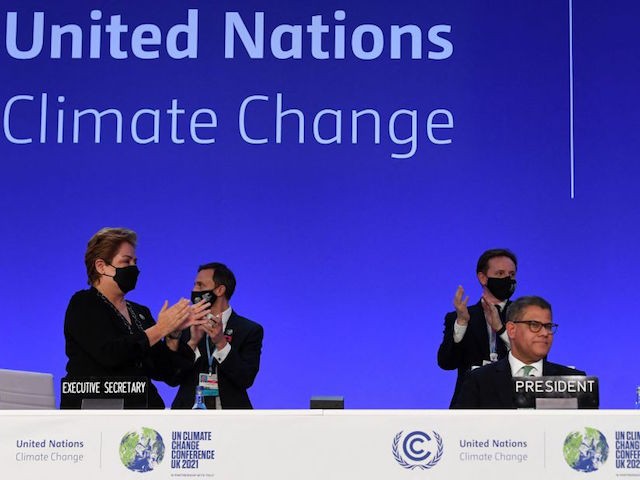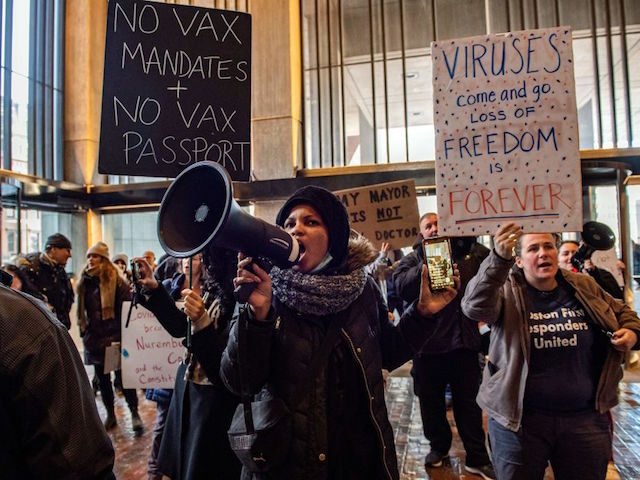The coronavirus pandemic has been an indisputable boon for authoritarianism. Individual liberty and personal sovereignty are in retreat around the world.
Tyrannical China is rising as the dominant world power, having paid no price for unleashing the disease, while the United States and its allies are having deep second thoughts about economic freedom, free speech, and other bulwarks against authoritarian control.
Here are five ways the coronavirus pandemic drove the worldwide ascendancy of authoritarianism:
Growing Chinese Power

The ambassador of China to Burundi, Zhao Jiang Ping (L), and The Burundi Minister of Health Thadee Ndikumana (R), sign before speaking to journalists about 500,000 donated doses of China’s Sinopharm vaccine at a ceremony in the economic capital Bujumbura on October 14, 2021. (TCHANDROU NITANGA/AFP via Getty Images)
China emerges from the pandemic with more geopolitical influence than ever. Beijing used “vaccine diplomacy” to buy influence from developing nations by donating millions of doses of its dubious vaccines.
The staggering economic damage inflicted upon other nations by the coronavirus appears to have accelerated China’s timetable for becoming the dominant economic power in the world, although there are analysts who believe Beijing’s reliably false economic reports mask systemic weaknesses that could kneecap its meteoric growth, such as its rickety real-estate system and its faltering power grid.
For the moment, China is more influential than it was in 2019, and a growing number of Americans appear to be conscious of the danger. China relentlessly uses its influence to attack capitalism and democracy, touting authoritarianism as a superior model for dealing with crises like the Chinese coronavirus. The alleged failure of the U.S. government to handle a disease China supposedly brought swiftly under control has become a staple of Chinese state media editorials.
China is aggressively using its economic and political influence to spread its authoritarian ideology of “socialism with Chinese characteristics” across the developing world.
China’s Belt and Road Initiative (BRI) is colonizing the Third World with debt to Chinese banks and swarms of Chinese workers, who invariably get the lion’s share of the jobs created by BRI infrastructure programs. China’s military and technical assistance comes with ideological indoctrination programs, increasingly conducted at regional academies China is building in developing nations.
There is very little in the way of an organized program to promote freedom and democracy over authoritarianism in the developing world. Foreign exchange students in the U.S. are unlikely to hear a passionate argument for democracy and capitalism.
Mandates and Lockdowns

Protesters gather against vaccine mandates and coronavirus-related restrictions on December 19, 2021, in Nuremberg, Germany. (Leonhard Simon/Getty Images)
Even without the malign influence of Communist China, the Western world is growing increasingly accustomed to authoritarian commands from nominally limited governments. It is difficult to discern the meaningful limitations on governments that can order its citizens to inject themselves with medications and punish them harshly for non-compliance.
Much of the punishment is being administered by politically cooperative corporations, a deeply troubling trend of using “private” muscle to bypass the legal limits on government power. A generation ago, evil giant corporations were stock villains in popular culture; today, the American public meekly accepts giant corporations as enforcers of the ruling Party’s will. Previous experiments with using politically controlled corporations to implement political directives have not ended well.
Enforcing vaccine mandates will inevitably lead to a massive expansion in government surveillance. A proposal was made this week to implant “vaccine passport” microchips in human beings to track their vaccination status, an idea that would have been the stuff of dystopian science fiction horror stories a few years ago. Facial recognition systems to enforce quarantines have also been tested.
Some form of electronic monitoring system seems inevitable, for the convenience of the bureaucracy – and once it has been imposed, there is every reason to believe it will expand far beyond coronavirus vaccine compliance, evolving into something like China’s “social credit system.”
People are discovering their paper “vaccine passports” expire much more quickly than they anticipated, setting up an endless loop of surveillance and compliance to obtain booster shots and updated papers. Without those papers, the “unvaccinated” – a term that will soon refer to people who received two vaccine shots, but no boosters – will find themselves locked out of public facilities.
“To put it simply, if you have been living vaccine-free, your time is up. If you wish to live life with the ease to do things you love, you must be vaccinated,” thundered Chicago mayor Lori Lightfoot on Tuesday when announcing proof of vaccination will be required to enter bars, restaurants, fitness centers, and entertainment venues. This is the language of authoritarianism, not republicanism.

Chicago Mayor Lori Lightfoot leaves a Chicago Police Department promotion and graduation ceremony on October 20, 2021 in Chicago, Illinois. (Scott Olson/Getty Images)
Grim as the lockdowns might have been in America, they pale in comparison to the virtual police states imposed by ostensibly free nations like Australia and New Zealand, complete with “quarantine camps.”
Huge protests against draconian coronavirus measures erupted across Europe in November, and even high-compliance societies like South Korea are growing uneasy with repeated clampdowns against virus outbreaks.
Coronavirus lockdowns inflicted immeasurable physical and mental damage on the population, and there are studies demonstrating that the groups the Left claims to care about the most suffered the most. The negative effects of lockdowns on children are especially disturbing, since the full impact has yet to be measured.
From the standpoint of rising authoritarian power, the most disturbing cultural and psychological impact of the lockdowns is the rise of the “laptop class” – people who can permanently work from home, address all their physical needs with delivery services, and feel little urge for in-person social contact.
This is a population ripe for domination. Much of the laptop class desires a level of perceived security and control that only authoritarian regimes can provide. It places little value on the freedoms that would be lost as Western societies transition away from limited representative government. To put it bluntly, a dismaying portion of the laptop class doesn’t really want the lockdowns to end, ever.
Censorship and speech control
The pandemic accelerated a trend toward speech control and censorship that was already far too pronounced at the beginning of 2020. Populations across the Western world are now accustomed to censorship diktats against ideas the ruling Party and its corporate allies find objectionable.
Human rights groups noted a surge of speech controls and bans on free assembly justified as coronavirus-fighting measures over the past two years. In some cases, deadly force was employed to suppress speech deemed “threatening to public health.” Authoritarian regimes found the Chinese coronavirus a very handy excuse for shutting down protests and opposition political rallies.
Social media giants declared war on “disinformation” – which they selectively define as they please, according to their political preferences, before opening fire on it with heavy censorship artillery. Somehow the bans, “fact-checks,” and content warnings never seem to hit targets on the Left.
New restrictions are greeted with weary acceptance – or thunderous applause, from the enemies of the silenced – rather than firestorms of principled outrage. A rare exception occurred this month, when Twitter updated its “anti-disinformation” policies to include a ban on “false or misleading claims that people who have received the vaccine can spread or shed the virus to unvaccinated people” – an absolutely true and scientifically accurate, but politically troublesome, statement. Twitter responded to a public outcry by saying the new rule was a typographical error and would not be enforced.
History struggles to provide an example of a crackdown on “disinformation” that did not become politicized and authoritarian in character. China’s titanic Internet censorship apparatus began as a crusade against disinformation and “false news.”
The Chinese Communist Party still justifies its oppressive speech controls as an effort to control disinformation – and it very much wants American Big Tech companies to follow its lead.
Crackdowns and Oppression

An aerial view of police officers patrolling Ipanema beach during the closing of the beaches according to a municipal decree to curb the spread of Chinese coronavirus on March 21, 2021, in Rio de Janeiro, Brazil. (Buda Mendes/Getty Images)
The pandemic years saw a pronounced increase in the use of oppressive tactics against activists and opposition politicians by autocratic regimes.
Coronavirus quarantine protocols quickly morphed into crackdowns on political dissent. Leading democracies were consumed with their own coronavirus battles, so authoritarian regimes felt free to smash their opponents.
Criticizing the coronavirus response of such a regime became one of the fastest routes to prison. Accusing political opponents of violating coronavirus safety rules became a popular pretext for arresting them.
Coronavirus outbreaks caused numerous elections around the world to be canceled or postponed. Sometimes these delays were welcomed as sound health policy, but sometimes they proved very convenient for dictatorial regimes.
“Governments around the world have taken on extraordinary powers to tackle the crisis. As we begin to return to normal, it is vital that the checks and balances on executive power also return to normal as soon as possible. In many places, however, there are worrying signs that the pandemic will leave in its wake increased authoritarianism and weakened rule of law,” warned global anti-corruption watchdog Transparency International in May 2020.
Other human rights groups complained about governments using pandemic emergency powers as targeted weapons against political opponents and restless minorities. The Chinese coronavirus was invoked by police states as an excuse to expel foreign journalists and human rights monitors.
A lingering question heading into 2022 is how willing governments, including those in the United States and Europe, will be to relinquish coronavirus emergency powers. The BBC in April warned about the “stomp reflex” of high-level political elites who use crises like the pandemic to claim extraordinary powers while asserting there is no time for proper constitutional debate or oversight. Those elites may prove reluctant to concede the state of emergency has passed.
A related concern is that coronavirus emergency powers will be repurposed by invoking an endless list of crises, which the elite will insist are every bit as serious as Chinese coronavirus was. The obvious candidate for such mission creep is climate change – and indeed, some powerful and influential people are already arguing climate change merits a perpetual state of emergency in which powers invoked to combat the pandemic become permanent tools in the hands of government officials.
The Great Reset

Britain’s President for COP26 Alok Sharma is applauded after making his concluding remarks during the COP26 UN Climate Change Conference in Glasgow on November 13, 2021. (PAUL ELLIS/AFP via Getty Images)
Opportunistic politicians saw the pandemic as a golden opportunity to impose what they broadly describe as “The Great Reset.”
Specifics of these proposals vary, but nearly all of them would dramatically increase the power, wealth, and centralization of government, with corresponding reductions to individual liberty. A more “equitable” world is to be created by giving an elite political class greater power to divide its spoils.
To put it simply, the Great Reset is about rebooting democracy with an authoritarian core – a new vision of “democracy” in which the ability of citizens to disobey the State, or vote against the consensus of State experts, is greatly reduced.
The huge “stimulus” programs and extended unemployment programs imposed during the pandemic may well evolve into a Universal Basic Income (UBI) system. Some politicians and academics are not shy about demanding such an evolution.
UBI is a profoundly authoritarian concept in which the State becomes the principal “employer” of the entire population. Everyone receives a guaranteed “salary” from the government, and may then choose to seek actual productive employment to generate additional income.
A government that provides the basic livelihood for the entire electorate has no reason to fear its voters, and would certainly never need to worry about any serious attempt to contain or reduce government spending. Rest assured that the very first penny of all future spending cut proposals would be taken from UBI checks – instantly creating an army of serfs furiously opposed to all spending cuts.
Furthermore, the fantasy of UBI proponents about eliminating the welfare state in favor of clean and simple “income” checks would, in practice, lead to a bloated UBI system in addition to all the social spending currently undertaken by the government. Governments become inherently authoritarian when they grow to titanic size, exerting so much power over individuals and such micromanagement of the “private sector” that meaningful civilian control of the State becomes an illusion.

COMMENTS
Please let us know if you're having issues with commenting.